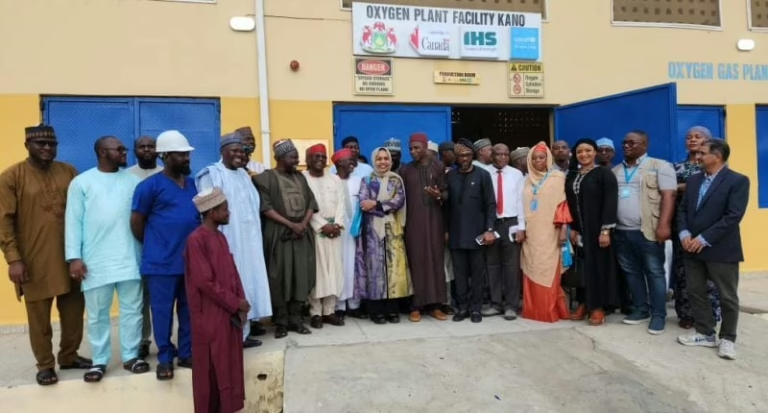The United Nations Children’s Fund (UNICEF), in partnership with the governments of Canada, Norway, and IHS Towers, has officially transferred a cutting-edge solar-powered oxygen generation facility to the Kano State government.
During the commissioning ceremony held at Muhammadu Buhari Specialist Hospital in Kano, UNICEF’s Nigeria representative, Ms. Wafaa Saeed, hailed the plant as “a symbol of innovation and endurance” poised to save numerous lives.
She highlighted that this solar-driven oxygen plant will play a crucial role in mitigating severe oxygen shortages, especially benefiting newborns and children suffering from pneumonia and other respiratory conditions.
Ms. Saeed further emphasized that the facility guarantees a steady oxygen supply even during electricity disruptions and serves as a pioneering model for similar projects nationwide.
Addressing the event, Dapo Otunla, Senior Vice President of IHS Towers Nigeria, noted that this installation is part of a broader national initiative aimed at bolstering oxygen availability in healthcare institutions.
“Today’s unveiling reflects the fruition of our 2022 partnership with UNICEF to enhance oxygen access for treating pneumonia, COVID-19, and other hypoxia-related illnesses, with a focus on newborns and expectant mothers,” Otunla stated.
He added, “So far, nine fund-to-support-nigerias-push-for-sustainable-health-financing/” title=”Global … To Support Nigeria’s Push For Sustainable Health Financing”>oxygen plants have been established across Nigeria-in Rivers, Bauchi, Kaduna, Ebonyi, Cross River, Yobe, and Kano States.”
“Since becoming operational in March 2024, these facilities have produced over 103,000 litres of medical oxygen, supporting approximately 1,500 to 2,500 patients each month,” he revealed.
Otunla concluded by underscoring that this initiative not only fortifies healthcare infrastructure but also exemplifies the impact of collaborative efforts in advancing Sustainable Development Goal 3, which focuses on ensuring healthy lives and promoting well-being for all.
In a complementary development, the UK government, through its Foreign Commonwealth Development Office (FCDO) and in collaboration with UNICEF, has delivered 55 climate-resilient infrastructures to Kano State. These include 27 primary healthcare centres and 28 schools distributed throughout the region.
At the handover event held at Wangara Primary School in Gezawa Local Government Area, the UNICEF representative remarked that these projects were completed over the past year in close partnership with the state authorities.
She explained that the new facilities incorporate environmentally adaptive features such as enhanced natural airflow, flood-resistant construction, and solar energy systems. These innovations aim to create cooler educational spaces, ensure dependable power supply, and provide safer childbirth environments for mothers.
Governor Abba Yusuf, who welcomed the delegation at the Government House, expressed gratitude for the support, noting that the initiatives align perfectly with the state’s agenda to advance education, healthcare, and human capital development.
He pledged that the government would effectively utilize these resources, integrating them into its strategic framework to deliver life-saving services and foster sustainable learning environments.






















